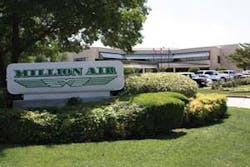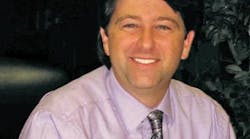ADDISON, TX — The Million Air fixed base operation here has been involved in a lot of industry history in the past 26 years; in fact, when it opened it set a new standard for corporate aviation service facilities while introducing the franchise concept in 1985. The FBO grew out of the Mary Kay cosmetics company’s corporate flight department, and Mary Kay Ash’s son Richard Rogers remains the owner. Relates Million Air president Jack Hopkins, who has been with the company since the beginning, “We’ve been very lucky that we’ve had the same owner throughout who has had a total commitment to the business. So, I guess we’re still operating old school.” When it comes to operations, however, the company is more new school, says Hopkins, with increasing success in aircraft management, augmenting its ongoing history with line/hangar services. And the growth in charter/management is impacting how the FBO goes to market.
When Million Air opened its doors, the FBO industry was a different animal, agrees Hopkins. The idea of investing millions into a fixed base operation dedicated to corporate aviation customers was a fairly new one. And, at a time when the industry sector was in decline, it was questioned by some as a bad investment, or by those who objected to the name.
Recalls Hopkins, “When Richard built this place, people thought he was crazy. This was one of the first really nice FBOs built. At that time, a typical FBO was a hangar with a side facility.
“They also thought he was crazy to be at Addison Airport,” which lies some 20 miles north of downtown Dallas; Love Field is positioned between the two.
“It was a struggle through the ‘80s and ‘90s; things really started picking up mid-90s; the fractionals started to have an impact,” adds Hopkins.
“As time has gone on, this type facility has become more the norm, and today you have people that are spending $10, 20, 30 million to build an FBO.”
The Million Air campus at Addison features seven corporate hangars, encompassing some 95,000 square feet of aircraft storage space. A recent addition at the facility has been U.S. Customs, which is having the added benefit of introducing the FBO location to some who normally use Love Field, according to Hopkins.
“They live here in our facility, which has been a nice thing,” he says. “We even get a lot of aircraft based out of Love Field who clear through here nights and weekends; we’re 24/7 whereas Love Field is pretty much normal hours, Monday through Friday.
“The city of Addison stepped up and agreed to pay the salary to have an agent here full time. We offered to give them the space.”
Increasing Emphasis on Charter/Management
Hopkins explains that the FBO has placed a heavy emphasis over the past five or so years on growing the aircraft management business, and subsequently charter. That has also led to expansion of the in-house maintenance department, which services aircraft under the Million Air umbrella.
The company currently has some 20 aircraft under its charter/management division — everything up to a G-450, says Hopkins. All planes are based at Addison except for Hawkers based at Love Field and at Spirit of St. Louis Airport outside St. Louis.
He explains, “We’ve been able to build a nice fleet of aircraft; at the same time, I think we’ve really improved our reputation, and it’s really coming around to bring us a lot of business.
“We had a local guy just the other day, a guy who has owned airplanes forever, who dropped off a Citation here and said, ‘I hear you’re the place to put my airplane on certificate. Let’s do it.’ It was that easy.
“It’s a small world, and your reputation is the most important thing. It’s one thing reaching the pilots and crews, but the aircraft owners and charter customers are a whole other group. And it’s kind of tough to get into that group. We’ve been working hard there; done a lot of functions here to bring people out.”
In April, Million Air hosted a ‘Wings and Wheels’ event to attract aircraft owners and charter prospects. Director of marketing Debbie Staggs comments that such events are now in the forefront of the company’s marketing approach — in line with the goal of connecting to owners.
Hopkins says that the FBO has been hit the past two years by the economic downturn, tracking with industry drops of 30 percent or more. At the height of the boom in 2007, Million Air was pumping some 500,000 gallons of fuel per month; today that figure is holding at around 300,000 gallons, say officials.
Interestingly, Hopkins says the charter and aircraft management division hasn’t been hit as hard, defying an industry trend, and that the company is seeing a significant uptick in lift in recent months.
Explains Hopkins, “This month, we doubled the amount of flight hours that we did a year ago this month – in 15 days. That’s a pretty good sign.
“The quality of the clientele is very good, too; we have prominent individuals and businesses that have uses and needs for the aircraft. They’re looking for a good management company to operate them. That’s worked out real well.
“We try to stay away from the guy who wants us to pay for his airplane. That doesn’t usually work so well.”
Million Air recently completed a refurbishment of its original lobby and interior, and is in the planning stage for a new 40,000-square foot hangar complex that will be for the exclusive use of charter/management customers.
“The cool thing about that is we’re going to have another lobby there, and that lobby will be just for our managed aircraft and charter customers,” relates Hopkins.
“We’re going to split up the business and make that a private terminal just for them. Then we’ll use this terminal for our transients and the rest of our based customers. We think that’s going to be a nice little niche in charter management – give them a bit of privacy and make them feel special. They all like that.”
Today, a franchisee
In 1985, Million Air launched the industry’s first FBO franchise enterprise — Million Air Interlink — creating a nationwide branding and marketing initiative into which locally owned operators could join to expand their market reach. A local FBO could now be perceived as part of a national chain, or brand.
During most of the ensuing years, the company was headed up by Lou Pepper, who today is president of Atlantic Aviation. Hopkins explains that Rogers subsequently sold the franchise company to Pepper, who teamed up with investors to acquire Atlantic. The Interlink franchise was subsequently sold to the Houston Million Air, headed up by Roger Woolsey.
Comments Hopkins, “They’ve done a real good job of bringing consistency to the franchises. Roger is a big help to new FBOs who have no idea how an FBO operates. He’s a huge help with the training classes.
“He’s brought a lot of excitement to the business; he’s full of energy.”
Once the franchise’s headquarters, Million Air at Addison is today one of the franchisees. Officials here view the change as just another part of FBO history.






